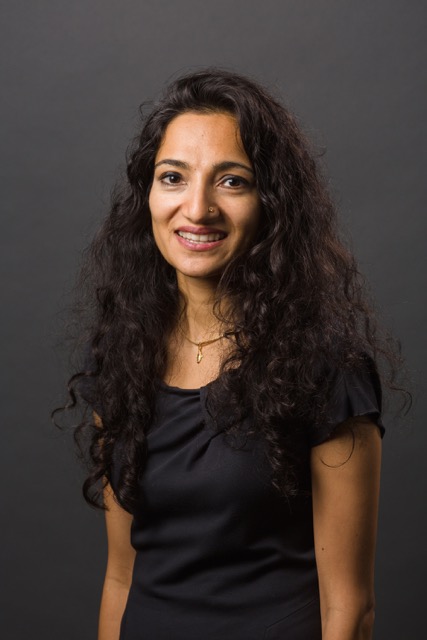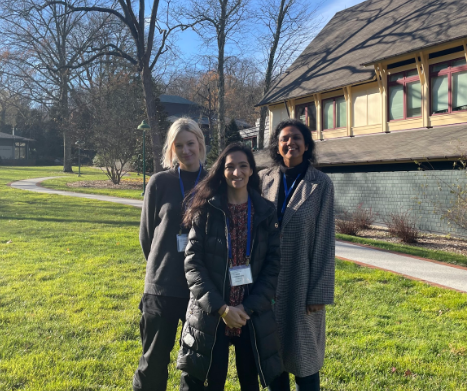Designing the Future of Medicine: Smita Krishnaswamy’s Journey to Entrepreneurship

Designing the Future of Medicine: Smita Krishnaswamy’s Journey to Entrepreneurship
Written by Grace Rangel, YC ’25
“Our vision is to create a world-class AI-driven small molecule design company with products that can have enormous impact on the drug development industry.”
FACULTY INNOVATOR
Smita Krishnaswamy, PhD, Associate professor in Genetics and Computer Science and co-founder of Ascent Bio
STARTUP
Dr. Krishnaswamy is an Associate professor in Genetics and Computer Science. She is also affiliated with the applied math program, computational biology program, Yale Center for Biomedical Data Science and Yale Cancer Center. Her startup, Ascent Bio, generates insights from high-throughput screening datasets to design more effective treatments with an emphasis in small molecule therapeutics.
What inspired you to found this company? Was there a specific research breakthrough or problem that drove you to pursue commercialization?
We saw an incredible unmet need in drug development, specifically the slow and inefficient way molecules are optimized through cycles of small modifications and screening. The research breakthrough came from a project where we developed a deep learning model that enabled much greater efficiency and control during the molecule design process through the use of latent molecule embeddings. Excitingly, this approach can be extended into a flexible framework for latent space optimization and be used for numerous therapeutic design challenges. We honed this potential to develop a robust molecule design platform for small molecule therapeutics.
Can you describe the core technology or innovation behind your company? What differentiates it from other solutions on the market?
The core insight is that molecule design across the industry is a difficult multi-property challenge that drug developers today attempt to solve using slow, inefficient methods. Our technology leverages the ability of deep learning models to learn rich representations of data and create implicit embedding spaces of molecules, known as latent spaces. We developed a model that creates a latent space amenable to molecule design and can be used for controllable, multi-property optimization. The quality of molecules that can be produced over a short design run marks a large improvement over alternative solutions. We also view this molecule design solution as incredibly portable and scalable, with a custom molecule design API being an option for any company with molecule design needs.
How do you envision your innovation's broader societal or industry impact?
 Looking at the larger picture, there are over 20 thousand active drug programs today with likely only a very small fraction ever reaching a Phase 1 clinical study. This means many promising therapeutics face incredible odds to reach the patients that need them. We strive to address this by empowering R&D teams to be much more productive and reach their molecule design goals faster, especially in contexts with limited data. Leveraging the unique scalability of our platform, we believe our solution can help companies across the industry be more productive and change the status quo on drug development.
Looking at the larger picture, there are over 20 thousand active drug programs today with likely only a very small fraction ever reaching a Phase 1 clinical study. This means many promising therapeutics face incredible odds to reach the patients that need them. We strive to address this by empowering R&D teams to be much more productive and reach their molecule design goals faster, especially in contexts with limited data. Leveraging the unique scalability of our platform, we believe our solution can help companies across the industry be more productive and change the status quo on drug development.
Have you leveraged any unique Yale resources (labs, students, faculty, etc.) in growing the company?
With a founding team that brings diverse expertise and spans multiple schools at Yale—including Dr. Smita Krishnaswamy, Associate Professor of Genetics and of Computer Science, Egbert Castro PhD '23 in Computational Biology, Xuefei Gao MBA, MPH '23 and Kevin Bijan Givechian MD, PhD'27, we were fortunate to benefit from Yale's extensive resources. We have received invaluable guidance on spinning out from Yale Ventures, early recognition from Nucleate New Haven and the Tsai Center for Innovative Thinking, and awards and fellowships from the Yale School of Management. Additionally, we collaborated with the Yale Biotech Club on an externship program this past summer, allowing us to work with talented students from Yale.
What is your long-term vision for the company regarding innovation, impact, or potential exit?
Our vision is to create a world-class AI-driven small molecule design company with products that can have an enormous impact on the drug development industry. With our current work on the platform, we can see a future where each R&D team has access to their own chemical reasoning engine capable of integrating different sources of data, instantly proposing molecule designs, and supporting the work needed to develop safe and effective therapeutics.
